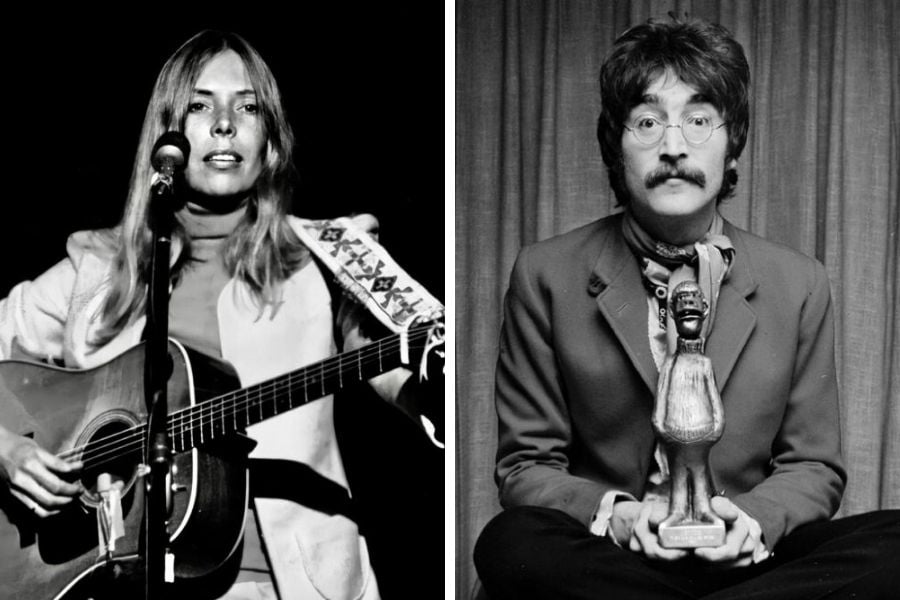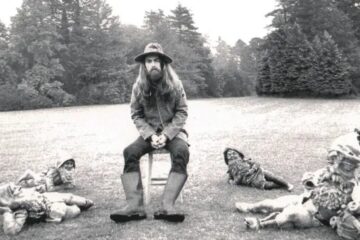Joni Mitchell once warned: “I know I’m going to get into hot water if I get into this, but I have controversial opinions about him”. She was talking about John Lennon, who was one of the most celebrated musicians in the world at the time and continues to be thought of in messianic terms to this day. A countercultural icon, Lennon was the mystic force behind The Beatles, fusing spirituality with songwriting and delivering a message of utopic unity. Despite penning the peace-loving anthem ‘Imagine’, the Liverpudlian wasn’t all flowers and rainbows.
The songwriter was known to have a furious temper and, in later life, tried to regulate himself to avoid falling into the traps of toxic behaviour. However, it meant that on occasion, he was susceptible to vitriolic spurts of anger towards his own work, bandmates and contemporaries. Reciprocating Joni Mtichell’s sentiments, Lennon made it very clear he and the ‘A Case of You’ singer didn’t get along.
Mitchell was equally unafraid as the Beatle continued to ruffle a few feathers and rarely shied away from delivering her own barbs towards musicians with whom she had a problem. Despite that, Mitchell was quick to acknowledge that denigrating Lennon was kicking the hornet’s nest. Nevertheless, with the accuracy of a martial arts enthusiast, she delivered a swift roundhouse to the buzzing bulge of angry fandom. The truth is that Mitchell was massively irritated by Lennon’s digs at her songwriting ability, and given that the Beatle was such an ardent Bob Dylan fan, Mitchell found it frustrating that he put her on a separate pedestal and kept telling her to go more commercial with her folky sound.
Mitchell had carved out a career as the new female hero of folk, and after Blue was released in 1971, fans were introduced to her unique blend of confessional songwriting. This record, and those that followed, confirmed why she continues to be a contemporary inspiration, touching the work of Lana Del Rey and Taylor Swift. With heartbreaking tenderness, Mitchell wrote with vulnerability that felt completely new and honest. Still, Lennon wasn’t impressed.
The two crossed paths when Mitchell was in a flurry of creativity and working on a new album. Meanwhile, Lennon was engaged in a strange love triangle with Yoko Ono and their assistant, May Pang, and was being routinely thrown out of nightclubs with Harry Nilsson. Dubbed ‘The Lost Weekend’, a name borrowed from a hit Billy Wilder film to categorise a period of self-inflicted turmoil, the era was Lennon’s lowest creatively and perhaps points to the reason for his issues with Mitchell, slamming her for giving away her best songs.
“When I met John Lennon, it was during his lost year in LA y’know,” Mitchell once explained. “And he came up to me to say, ‘Oh it’s all a product of overeducation; you want a hit, don’t you?’” She was cutting 1974’s Court and Spark at the time, and he was sitting across the hall from her.
He kept saying: “‘You want a hit, don’t you? Put some fiddles on it! Why do you always let other people have your hits for you y’know?’”, she recalled. For a songwriter in the ascendency, Mitchell would have likely struggled to take Lennon’s advice with good humour. She was now the artist with the bit between her teeth, the intoxicating cocktail of creative artist and commercial viability swirling in the highball positioned in her hand. But it was likely the former remark of her “over-education” that would have stung most of all.
Lennon had often positioned himself as the people’s champion, most notably in the song, ‘Working Class Hero’. A Liverpool lad who had crawled through the grit of the city to reach the intellectual heights of the counterculture movement, the chip on Lennon’s shoulder had always been seasoned with a refusal to conform to unwarranted high-brow attitudes. But, this time, his aim was off.
Lennon seemingly knew nothing of Mitchell’s upbringing as the daughter of a teacher and a grocer. He also missed the memo on the songwriter’s life-threatening polio, which she contracted at age nine, and the small-town life she sang about in ‘Song for Sharon’. Perhaps owing to the jazz infusions she was bringing to folk, Lennon had decided she was too upper-class in her musicality.
“That’s a class difficulty he had,” Mitchell later told Macleans. “He’s a working-class lad. I’m sure he had that same fight with George Martin because he was afraid that he was betraying his class.”
As well as mentioning The Beatles’ producer, Mitchell reflected on an English documentary she had seen, which charted the best musicians of the 20th century. “As soon as it hit my era, the intelligence of it dropped considerably,” she sighed. “When it came to me, this guy folded his arms and crossed his feet and said, ‘I never liked Joni Mitchell – she’s too twee.’ Well, that’s what John Lennon was like.”
Whether Lennon felt threatened by Mitchell will never be known, but to label her as twee, or anything akin to it, would be one of the bigger miscategorisations in music history. Listening to her work, it is easy to hear beyond the sweet melodies and get to the wretched truth of humanity she delivers in every song. A trick that Lennon himself perfected while with The Beatles.




